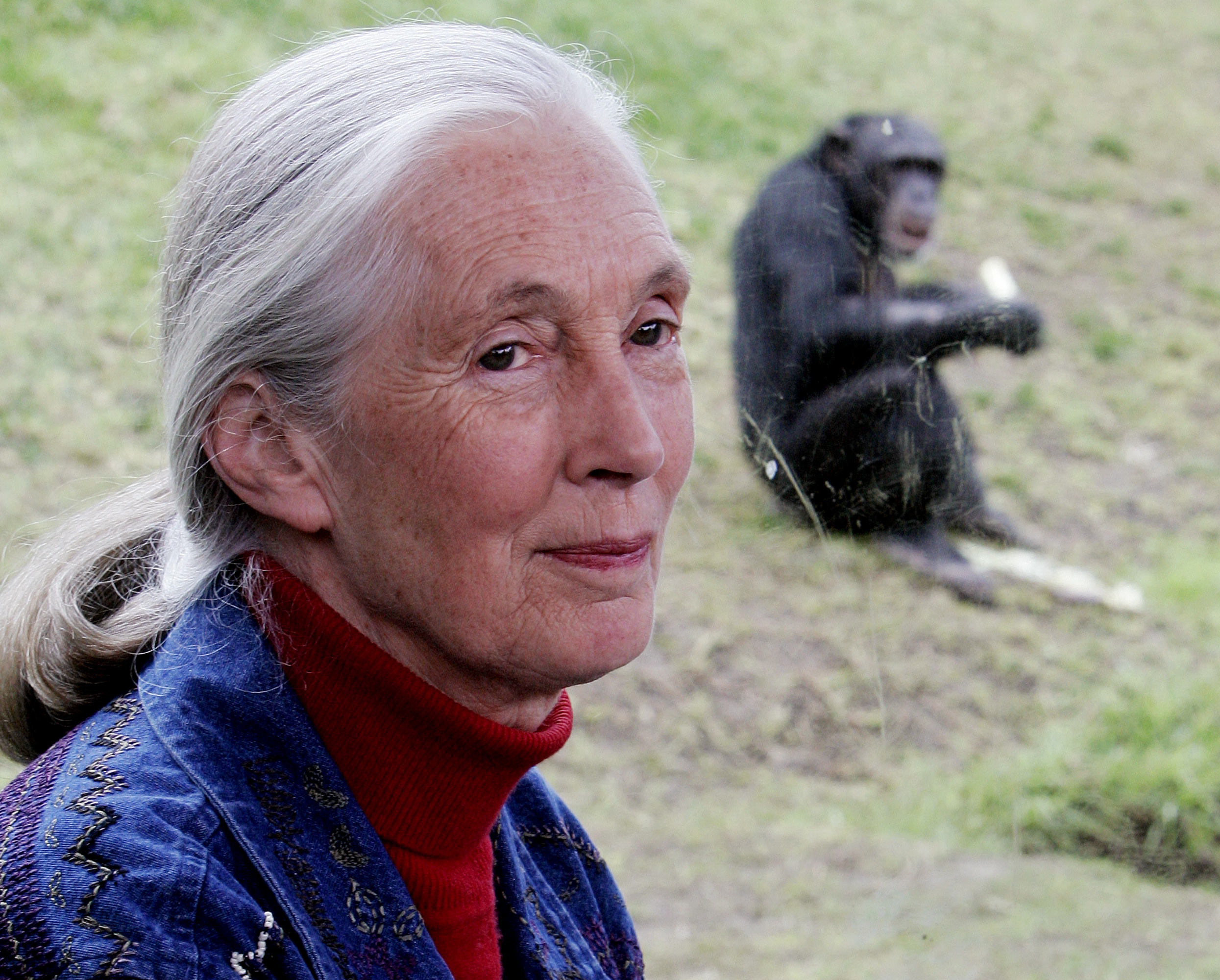Jane Goodall, primatologist and frequent flyer, turning 80
Tuesday, February 11, 2014
 Primatologist Jane Goodall sits near a window where behind a chimpanzee eats in its enclosure at Sydney's Taronga Zoo. Jane Goodall, who turns 80 thus year knows how to work a crowd. In a packed auditorium, the elegant primatologist from Britain whooped like the chimpanzees she first studied in Tanzania in the early 1960s. She hugged an academic just like, she said, chimps do. She talked about her crush, as a "romantic little 10-year-old," on Tarzan, the fictional figure raised by apes.
Primatologist Jane Goodall sits near a window where behind a chimpanzee eats in its enclosure at Sydney's Taronga Zoo. Jane Goodall, who turns 80 thus year knows how to work a crowd. In a packed auditorium, the elegant primatologist from Britain whooped like the chimpanzees she first studied in Tanzania in the early 1960s. She hugged an academic just like, she said, chimps do. She talked about her crush, as a "romantic little 10-year-old," on Tarzan, the fictional figure raised by apes.JOHANNESBURG - Jane Goodall, who turns 80 this year, knows how to work a crowd.
In a packed auditorium, the elegant primatologist from Britain whooped like the chimpanzees she first studied in Tanzania in the early 1960s. She hugged an academic just like, she said, chimps do. She talked about her crush, as a "romantic little 10-year-old," on Tarzan, the fictional figure raised by apes.
"What did he do? He married the wrong Jane," Goodall lamented to laughter on Friday at the University of the Witwatersrand, whose officials wished her a happy birthday. Her birthday is actually April 3, and Goodall said she was perplexed by the hoopla.
Goodall, a protege of anthropologist Louis Leakey, documented the relationships and other behavioral patterns of chimpanzees, finding parallels with human conduct that spurred debate about evolution. Now she is an environmental activist, traveling 300 days a year to speak for those species, as one admirer put it, "who cannot speak."
The woman who said she got "depressed" in the early days of research, when chimpanzees vanished into the forest at her approach, is also part of popular culture. The United Nations designated her a peace messenger. Goodall's character has popped up in television parodies. A celebrated photograph shows a chimpanzee reaching out to her in a kind of "E.T." moment, reminiscent of the finger touch between alien and child in the science-fiction movie.
"There's no really sharp line dividing us from the rest of the animal kingdom," Goodall said in an hour-long speech that was part autobiography, part save the planet. She acknowledged that chimpanzees don't gather in auditoriums, send robots to Mars and communicate with words.
Creatures can be sneaky, though. One of Goodall's favorite stories is about an aquarium where fish were disappearing after closing time. A camera was set up to get to the bottom of the mystery. It turned out that an octopus was walking across the floor to other fish tanks for a meal, then innocently returning to its own tank by morning.
Goodall's 22-page resume, posted on the website of the Virginia-based institute that carries her name, lists the many advisory boards she sits on, honorary degrees and awards (well over 100, including Dame of the British Empire and French Legion of Honor). She gives talks with a stuffed monkey propped on the podium. She has also traveled with a rock from the prison island where Nelson Mandela, the South African anti-apartheid leader who died Dec. 5, toiled in a quarry for years.
She has planted trees in Singapore, voted on favorite artwork by chimpanzees (the winner used only his tongue), picked up $1 million from Microsoft co-founder Paul Allen last year to study and protect gorillas in Africa and ridden in a carriage as grand marshal at the Rose Parade in Pasadena, California. Next month, she'll view a migration of sandhill cranes in Nebraska.
A columnist in News24.com, an online news outlet in South Africa, was impressed, writing that the octogenarian "in a society terrified of aging, makes having reached this milestone seem, well, cool."
Last year, the release of Goodall's book about trees and plants, "Seeds of Hope," was postponed because some passages were lifted from online sources and not properly credited. She said in a statement that she agreed to delay the book and "correct any unintentional errors."
The publisher, Hachette Book Group, lists an April release date.
